List of freshwater aquarium fish species
A vast number of aquatic species have successfully adapted to live in the freshwater aquarium. This list gives some examples of the most common species found in home aquariums.
Bichirs and reedfish
| Common name | Taxonomy | Image | Size | Tank type | Care level | Remarks | Temperature range | pH range |
|---|---|---|---|---|---|---|---|---|
| Gray bichir, Senegal bichir, or dinosaur bichir | Polypterus senegalus | 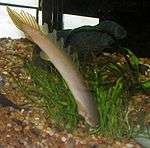 | 35.5 cm (14.0 in) in the wild, 9 in is more typical in home aquaria | Species | Easy | A large aquarium is preferred for this species because it is predatory. | 25–29 °C (77–84 °F) | 7.0-8.2 |
| Ornate bichir | Polypterus ornatipinnis |  | 60 cm (24 in) | Species | Easy to intermediate | 26–28 °C (79–82 °F) | 6.0–8.0 | |
| Retropinnis bichir | Polypterus retropinnis | 35 cm (14 in) | Species | Easy to intermediate | 26–28 °C (79–82 °F) | 6.5–7.5 | ||
| Reedfish | Erpetoichthys calabaricus |  | 40 cm (16 in) | Semi-aggressive community | Easy to intermediate | Nocturnal, can slither around out of water as long as they stay wet. | 22–28 °C (72–82 °F) | 6.5–7.5 |
Catfish
| Armored catfish including Aspidoras, Brochis, Callichthys, and Corydoras |
| Common name | Taxonomy | Image | Size | Tank type | Care level | Remarks | Temperature range | pH range |
|---|---|---|---|---|---|---|---|---|
| Brown-point shield skin longirostris | Aspidoras fuscoguttatus |  | 3.8 cm (1.5 in) | 22–25 °C (72–77 °F) | 5.5–6.8 | |||
| Aspidoras lakoi | 4 cm (1.6 in) | |||||||
| Loach catfish | Aspidoras rochai | 4 cm (1.6 in) | ||||||
| Sixray corydoras, false corydoras | Aspidoras pauciradiatus | 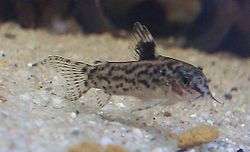 | 2.9 cm (1.1 in) | 73–82 °F (23–28 °C) | 6.5 | |||
| Britski's catfish | Brochis britskii | 8.9 cm (3.5 in) | Brochis is often synonymized with Corydoras. | |||||
| Emerald catfish | Brochis splendens |  | 10 cm (3.9 in) | Brochis is often synonymized with Corydoras. | 70–82 °F (21–28 °C) | 6.5 | ||
| Hognosed brochis | Brochis multiradiatus |  | 6.6 cm (2.6 in) | Brochis is often synonymized with Corydoras. | ||||
| Cascarudo | Callichthys callichthys | | 20 cm (7.9 in) | |||||
| Adolfo's catfish | Corydoras adolfoi |  | 5.7 cm (2.2 in) | 72–79 °F (22–26 °C) | 6.0-7.0 | |||
| Banded corydoras | Scleromystax barbatus |  | 10 cm (3.9 in) | |||||
| Masked corydoras, bandit corydoras | Corydoras metae | 4.8 cm (1.9 in) | 72–79 °F (22–26 °C) | 6.0-7.0 | ||||
| Barred-tail corydoras | Corydoras cochui | 2.5 cm (0.98 in) | ||||||
| Blackstripe corydoras | Corydoras bondi | 4.7 cm (1.9 in) | ||||||
| Blacktop corydoras | Corydoras acutus | 4.4 cm (1.7 in) | ||||||
| Blue corydoras | Corydoras nattereri | 5.4 cm (2.1 in) | ||||||
| Bluespotted corydoras | Corydoras melanistius | 5.1 cm (2.0 in) | ||||||
| Bronze corydoras | Corydoras aeneus | | 6.35 cm (2.50 in) | Community | Easy | The albino strain of C. aeneus is common among aquarists. | 77 °F to 82 ° (25 °C to 28 °C) | |
| Caracha | Corydoras atropersonatus | 4.5 cm (1.8 in) | ||||||
| Ehrhardt's corydoras | Corydoras ehrhardti | 4.1 cm (1.6 in) | ||||||
| Corydoras evelynae | 4 cm (1.6 in) | |||||||
| Corydoras geoffroy | 7 cm (2.8 in) | |||||||
| Corydoras latus | 5.2 cm (2.0 in) | |||||||
| Corydoras loxozonus | 4.9 cm (1.9 in) | |||||||
| Corydoras nain | Corydoras nanus | 4.5 cm (1.8 in) | ||||||
| Corydoras narcissus | 6.5 cm (2.6 in) | |||||||
| Corydoras ornatus | 4.9 cm (1.9 in) | |||||||
| Corydoras osteocarus | 4 cm (1.6 in) | |||||||
| Corydoras polystictus | 3.2 cm (1.3 in) | |||||||
| Scleromystax prionotos | 5.3 cm (2.1 in) | |||||||
| Corydoras semiaquilus |  | 6.0 cm (2.4 in) | ||||||
| Corydoras septentrionalis | 4.9 cm (1.9 in) | |||||||
| Corydoras simulatus | 4.9 cm (1.9 in) | |||||||
| Corydoras undulatus | 4.4 cm (1.7 in) | |||||||
| Dwarf corydoras | Corydoras hastatus |  | 3.5 cm (1.4 in) | Community | ||||
| Elegant corydoras | Corydoras elegans |  | 5.1 cm (2.0 in) | Community | ||||
| False network catfish | Corydoras sodalis | 4.9 cm (1.9 in) | ||||||
| False spotted catfish | Corydoras leucomelas |  | 4.5 cm (1.8 in) | |||||
| Green gold catfish | Corydoras melanotaenia |  | 5.8 cm (2.3 in) | |||||
| Guapore corydoras | Corydoras guapore | 4.1 cm (1.6 in) | ||||||
| Mosaic corydoras, reticulated corydoras | Corydoras haraldschultzi |  | 5.9 cm (2.3 in)[1] | Community | ||||
| Mosaic corydoras, reticulated corydoras | Corydoras reticulatus | 5.1–6.1 cm (2.0–2.4 in) | Community | |||||
| Panda corydoras | Corydoras panda |  | 3.8–5.1 cm (1.5–2.0 in) | Community | ||||
| Pastaza corydoras | Corydoras pastazensis | 6.4–7.1 cm (2.5–2.8 in) | ||||||
| Peppered corydoras | Corydoras paleatus |  | 5.1–7.6 cm (2.0–3.0 in) | Community | ||||
| Pink corydoras | Corydoras axelrodi | 4–5 cm (1.5–2 in) | ||||||
| Pygmy corydoras | Corydoras pygmaeus |  | 2.5–3.3 cm (0.98–1.30 in) | Community | ||||
| Sailfin corydoras | Corydoras macropterus | |||||||
| Salt and pepper catfish | Corydoras habrosus |  | 2.5–3.6 cm (0.98–1.42 in) | Community | ||||
| Schwartz's catfish | Corydoras schwartzi |  | 3.8–5.1 cm (1.5–2.0 in) | Community | ||||
| Spotted corydoras, longnose corydoras | Corydoras ambiacus | 5.1–6.1 cm (2.0–2.4 in) | ||||||
| Sterba's corydoras | Corydoras sterbai |  | 6.8 cm (2.7 in)[2] | Community | ||||
| Sychr's catfish | Corydoras sychri | |||||||
| Tailspot corydoras | Corydoras caudimaculatus | 4–5 cm (1.5–2 in) | ||||||
| Threestripe corydoras, leopard catfish | Corydoras trilineatus |  | 6.1 cm (2.4 in)[3] | Community | ||||
| Xingu corydoras | Corydoras xinguensis | 3.8–5.1 cm (1.5–2.0 in) | ||||||
| Julii corydoras | Corydoras julii |  | 5.1–6.4 cm (2.0–2.5 in) |
| Armored suckermouth catfish (plecos) |
| Common name | Taxonomy | Image | Size | Tank type | Care level | Remarks | Temperature range | pH range |
|---|---|---|---|---|---|---|---|---|
| Bristlenose pleco, bushynose pleco | Ancistrus spp. |  | The bristlenose genus has at least 59 identified species and many others yet to be named. | 70-80 F (20-27 C) | | | |||
| Gold nugget pleco | Baryancistrus spp. |  | Many species of this fish exist, but are not yet officially identified; the three common aquarium species are known as L-018, L-081, and L-177. | 77-86 F (25-30 C) | | | |||
| Whiptail catfish | Rineloricaria spp. | | 20 species | |||||
| Twig catfish | Farlowella spp. |  | at least 20 species | |||||
| Panaque | Panaque spp. | | Several species of panaque are popular aquarium fish. | |||||
| Pineapple pleco, orange cheek pleco | Pseudorinelepis spp. | | four species | |||||
| Common pleco, suckermouth catfish, Amazon sailfin catfish | Pterygoplichthys pardalis |  | 16 cm (6.3 in) | Easy | One of the several fish sold under this name; there is also an albino variation. | |||
| Common pleco, suckermouth catfish | Hypostomus punctatus |  | One of the several fish sold under this name. | |||||
| Common pleco, suckermouth catfish | Hypostomus plecostomus |  | 50 cm (20 in) | One of the several fish sold under this name. | ||||
| Leopard sailfin pleco, clown sailfin pleco | Pterygoplichthys gibbiceps |  | Other related fish also share this common name. | |||||
| Zebra pleco, L-046 | Hypancistrus zebra |  | ||||||
| Sailfin catfish | Pterygoplichthys multiradiatus | 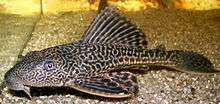 | ||||||
| Golden dwarf sucker, golden oto | Macrotocinclus affinis | | 5 cm (2 in) | A peaceful algae eater. Keep in groups of three or more. | ||||
| Zebra dwarf sucker, zebra oto | Otocinclus cocama |  | Community | |||||
| Goldspot ancistrus albino | Ancistrus sp. gold albino | 12 cm (4.7 in) | community | easy |
| Airbreathing catfish |
| Common name | Taxonomy | Image | Size | Tank type | Care level | Remarks | Temperature range | pH range |
|---|---|---|---|---|---|---|---|---|
| Walking catfish | Clarias batrachus | 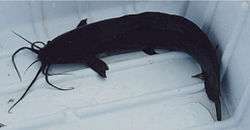 | 50 cm (19.5 in) | Easy/Intermediate | The albino form is common in the aquarium trade. This fish can survive out of the water and "walk" as long as kept wet, for a very long time. |
| Banjo catfish |
| Common name | Taxonomy | Image | Size | Tank type | Care level | Remarks | Temperature range | pH range |
|---|---|---|---|---|---|---|---|---|
| Banjo catfish | Bunocephalus coracoideus | | 2–15 cm |
| Talking catfish |
| Common name | Taxonomy | Image | Size | Tank type | Care level | Remarks | Temperature range | pH range |
|---|---|---|---|---|---|---|---|---|
| Striped Raphael | Platydoras armatulus | .jpg) | ||||||
| Spotted raphael | Agamyxis pectinifrons |  | Females at around 6 in, males slightly smaller around 5.5 in | Tropical aquarium | Intermediate | This species mainly feeds on algae. It needs a cave, and will feed when the aquarium light is out. |
| Squeakers and upside-down catfish |
| Common name | Taxonomy | Image | Size | Tank type | Care level | Remarks | Temperature range | pH range |
|---|---|---|---|---|---|---|---|---|
| Cuckoo squeaker | Synodontis multipunctatus | | 27.5 cm (10.8 in) | |||||
| Decorated squeaker | Synodontis decorus | |||||||
| Even-Spotted squeaker | Synodontis petricola |  | 10 cm (3.9 in) | |||||
| Featherfin squeaker | Synodontis eupterus | | ||||||
| Lake Malawi syno | Synodontis njassae | | ||||||
| Polka dot syno | Synodontis angelicus |  | ||||||
| Common syno, false upside-down catfish | Synodontis nigrita | |||||||
| Upside-down catfish | Synodontis nigriventris |  | 9.6 cm (3.8 in) | Community | S. nigriventris prefers bottom feeding on Tubifex, but its main diet consists of algae. |
| Shark catfish |
| Common name | Taxonomy | Image | Size | Tank type | Care level | Remarks | Temperature range | pH range |
|---|---|---|---|---|---|---|---|---|
| Iridescent shark | Pangasius hypophthalmus |  | Community | Albino form is common in the aquarium trade, needs a large aquarium | ||||
| Chao Phraya giant shark, giant pangasius | Pangasius sanitwongsei |  | Over 60 inches | The dwarf "balloon" form available is critically endangered. |
| Sea catfish |
| Common name | Taxonomy | Image | Size | Tank type | Care level | Remarks | Temperature range | pH range |
|---|---|---|---|---|---|---|---|---|
| Colombian shark catfish | Arius seemanni |  | ||||||
| Berney's shark catfish | Arius berneyi | |||||||
| Australian shark catfish | Arius graeffei |
| Sheatfish |
| Common name | Taxonomy | Image | Size | Tank type | Care level | Remarks | Temperature range | pH range |
|---|---|---|---|---|---|---|---|---|
| Glass catfish | Kryptopterus vitreolus |  | 8 cm (3.1 in). | Needs to be kept in a group of five or more | ||||
| Butter catfish, two-spot catfish | Ompok bimaculatus | 45 cm (18 in) | This fish appears very similar to Kryptopterus bicirrhis. |
| Bagrid catfishes |
| Common name | Taxonomy | Image | Size | Tank type | Care level | Remarks | Temperature range | pH range |
|---|---|---|---|---|---|---|---|---|
| Crystal-eyed catfish | Hemibagrus wyckii | 71 cm (28 in) | highly aggressive and must be kept alone | |||||
| Asian redtail catfish | Hemibagrus wyckioides | 130 cm (51 in) | highly aggressive and must be kept alone | |||||
| Sun catfish | Horabagrus brachysoma | | 45 cm (18 in) |
| Long-whiskered catfish |
| Common name | Taxonomy | Image | Size | Tank type | Care level | Remarks | Temperature range | pH range |
|---|---|---|---|---|---|---|---|---|
| Leiarius marmoratus | 100 cm (39 in) | |||||||
| Leiarius pictus | 60 cm (24 in) | |||||||
| Redtail catfish | Phractocephalus hemioliopterus |  | 120 cm (3.9 ft) | Needs a 300 US gallons (1,100 L) tank when mature | ||||
| Spotted pimelodus, pictus, pictus catfish | Pimelodus pictus |  | 30 cm (12 in) | These catfish are very appealing when small, but may grow somewhat large. Their mouths look small, but may eat smaller fish, as they can open their mouths very wide. | ||||
| Ornate Pimelodus | Pimelodus ornatus | |||||||
| Sturgeon catfish | Platystomatichthys sturio | |||||||
| Barred sorubim | Pseudoplatystoma fasciatum | 104 cm (3.41 ft) | Easy to confuse with P. tigrinum. | |||||
| Tiger sorubim | Pseudoplatystoma tigrinum |  | 130 cm (4.3 ft) | This fish is easy to confuse with P. fasciatum. | ||||
| Firewood catfish, (planiceps) shovelnose catfish | Sorubimichthys planiceps | 178 cm (70 in) | The largest of the shovelnoses, this catfish grows huge and will need a 450 US gallons (1,700 L) min when mature. | |||||
| Lima shovelnose catfish | Sorubium lima |  | 90 cm (3.0 ft) | Although they are smaller than the tiger shovelnose, these catfish are extremely aggressive and extremely fast. | ||||
| North American catfish |
| Common name | Taxonomy | Image | Size | Tank type | Care level | Remarks | Temperature range | pH range |
|---|---|---|---|---|---|---|---|---|
| Blue catfish | Ictalurus furcatus | 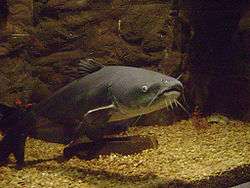 | ||||||
| Black bullhead | Ameiurus melas | | ||||||
| Stonecat | Noturus flavus | | ||||||
Characins and other characiformes
| Tetras |
| Common name | Taxonomy | Image | Size | Tank type | Care level | Remarks |
|---|---|---|---|---|---|---|
| Black phantom tetra | Hyphessobrycon megalopterus | .jpg) | 4.5 cm (1.8 in) | Community | Easy | the black phantom tetra enjoy being in groups of 6 or more and a slightly shaded tank. Males may claim small territories and occasionally minor battles may occur. The Phantom tetra goes well with other tetras of similar size. They also prefer floating plants. |
| Black neon tetra | Hyphessobrycon herbertaxelrodi |  | 4 cm (1.6 in) | Community | Easy | This fish is similar to the neon tetra other than coloration. |
| Black tetra, Skirt tetra | Gymnocorymbus ternetzi | | 5 cm (2.0 in) | Community | Easy | A highly spirited fish that may occasionally chase its own species as well as harass slow moving fish with long fins. This fish is very hardy and can stand a variety of water qualities. Disease is not a big problem with the black tetra. The black tetra is also known as the black skirt tetra. The female black tetra is more robust and larger than the male. |
| Bleeding heart tetra | Hyphessobrycon erythrostigma |  | 6.5 cm (2.6 in) | Community | Intermediate | the bleeding heart tetra is distinguished by the small red spot on both sides of the fish. This fish is very prone to diseases, and can grow larger than most tetra species. It is not recommended for beginners. |
| Bloodfin tetra | Aphyocharax anisitsi | | 5 cm (2.0 in) | Community | Easy | The Bloodfin tetra is distinguished by its red fins. This fish is generally peaceful. It will school with similarly sized and tempered fish. |
| Blue tetra | Knodus borki |  | 5 cm (2.0 in) | Community | ||
| Bucktooth tetra | Exodon paradoxus |  | 5 cm (2.0 in) | Exodon paradoxus will eat smaller fish and harass larger fish, lepidophage (scale eater). | ||
| Buenos Aires tetra | Hyphessobrycon anisitsi |  | 7.5 cm (3.0 in) | Easy | Hyphessobrycon anisitsi has some reputation as a "fin nipper" but it is a 50% chance | |
| Cardinal tetra | Paracheirodon axelrodi | | 5 cm (2.0 in) | Community | Easy | |
| Cave tetra, blind tetra | Astyanax mexicanus |  | 12 cm (4.7 in) | Easy | cave tetra is the blind cave form of the Mexican tetra. The blind cave tetra is easy to care for and is hardy. The fish is born with eyes, but they quickly deteriorate leaving behind two scars where the eyes once were. The blind tetra needs to be in a shoal in order to show peaceful behavior, and to prevent fin nipping. Despite their lack of eyes, the blind cave tetra can easily avoid other fish and obstacles in the tank. This tetra prefers low to moderate lighting. | |
| Congo tetra, Lufundi (native name) | Phenacogrammus interruptus | .jpg) | 7.5 cm (3.0 in) | Community | Intermediate | Sufficiently peaceful for home aquariums, though it may bite fishes smaller than its size. It is more comfortable in indirect light. Over-head lighting is preferred and under no circumstances should light be directed at the front or rear glass. |
| Diamond tetra | Moenkhausia pittieri | | Community | Easy | ||
| Emperor tetra | Nematobrycon palmeri |  | 5 cm (2.0 in) | Community | Easy | |
| Garnet tetra, pretty tetra | Hemigrammus pulcher |  | 6.5 cm (2.6 in) | Community | Easy | |
| Glowlight tetra | Hemigrammus erythrozonus |  | 3.75 cm (1.48 in) | Community | Easy | |
| Golden pristella tetra | Pristella maxillaris |  | 5 cm (2.0 in) | Community | Easy | |
| Green neon tetra | Paracheirodon simulans |  | 2.5 cm (0.98 in) | Community | Intermediate | |
| Head and tail light tetra | Hemigrammus ocellifer | 4 cm (1.6 in) | Community | Easy | ||
| Lemon tetra | Hyphessobrycon pulchripinnis |  | 5 cm (2.0 in) | Community | Easy | Very likely to jump out of the tank unless there are some floating aquatic plants |
| Long-fin tetra | Brycinus longipinnis | | 12.5 cm (4.9 in) | Community | Easy | |
| Neon tetra | Paracheirodon innesi |  | 3.75 cm (1.48 in) | Community | Easy | The neon tetra is sensitive towards water quality and is susceptible to many freshwater diseases. However, the fish is very peaceful and will not attack another member of the tank. Females are larger than the males. Due to their small size, the neon tetra should not be kept with large fish. Neon tetras are also very delicate and any harassment they may receive can result in death. This can be prevented by putting them with other small community fish or fish known to ignore their tankmates. The neon tetra feels the most comfortable when in groups. |
| Jellybean tetra | Ladigesia roloffi | Smaller even than the neon tetra. This mid west African species is a favoured species for the nano-aquarium. | ||||
| Penguin tetra, blackline penguinfish | Thayeria boehlkei |  | 6.5 cm (2.6 in) | |||
| Red Eye tetra | Moenkhausia sanctaefilomenae |  | 4 cm (1.6 in) | Community | Easy | |
| Red phantom tetra |  | 4.5 cm (1.8 in) | Community | Easy | ||
| Rummy-nose tetra | Hemigrammus rhodostomus |  | 5 cm (2.0 in) | Community | Intermediate | |
| Disk tetra | Myleus schomburgkii |  | 40 cm (16 in) | ph 5.0–7.0, temp 23 °C to 27 °C | ||
| Splashing tetra | Copella arnoldi |  | Community | Easy | ||
| Serpae tetra | Hyphessobrycon serpae | | 4.5 cm (1.8 in) | Community | Easy | This fish may nip the fins of slow-moving fish or fish smaller than it. It is best put with other large tetras or with fish of similar size or larger. |
| Silvertip tetra | Hasemania nana |  | 3 cm (1.2 in) | Community | Moderately easy | Silvertip tetras tend to be moderately aggressive and, because of their small size, should not be kept with large or aggressive fish. |
| X-ray tetra | Pristella maxillaris |  | Community | Easy | Also just called the X-ray fish. | |
| Yellow phantom tetra | Hyphessobrycon roseus | 4.5 cm (1.8 in) | Community with no long-finned fish | Easy | M aroni and Oyapock Rivers, French Guiana, South America. Most specimens in the trade are captive-bred. Female fish are slightly larger than males in fish of the same age. Will acclimatise to a wide range of conditions. pH: 6.0–7.5, dH: up to 25 degrees. Yellow Phantom tetras should be kept in shoals of six or more fish. The aquarium should be well-planted with rooted and floating plants in order to provide much-appreciated shady areas. They are usually peaceful with most other fish species, although there are reports of some specimens being a little nippy, so long-finned tank-mates are best avoided. Will eagerly accept most aquarium foods offered: flake, micro-pellets, small frozen foods such as daphnia and cyclops.A conditioned pair should be added to a specially set up breeding aquarium which should contain soft water with a pH below 6.5 and plenty of live plants, including Java moss. Once the eggs have been released or fertilised, the parents should be removed. The eggs should hatch after 24 hours, and after five days the fry will become free-swimming. The tiny fry should be fed on infusoria for the first week, followed by finely powdered first foods and baby brine shrimp. |
| Hatchetfish |
| Common name | Taxonomy | Image | Size | Tank type | Care level | Remarks |
|---|---|---|---|---|---|---|
| Common hatchetfish | Gasteropelecus sternicla | | Community | Intermediate | ||
| Silver hatchetfish | Gasteropelecus levis | Peaceful and dwells at the top of the tank in schools. Rarely breeds in captivity. This powerful leaper can easily jump out of an aquarium, so keep only in a fully covered tank. | ||||
| Marbled hatchetfish | Carnegiella strigata |  | 5 cm (2.0 in) | Community | Intermediate | Peaceful and dwells at the top of the tank in schools. Rarely breeds in captivity. This powerful leaper can easily jump out of an aquarium, so keep only in a fully covered tank. |
| Black-winged hatchetfish | Carnegiella marthae |  | 4 cm (1.6 in) | Community | Intermediate | Peaceful and dwells at the top of the tank in schools. The most hardy of all the hatchetfish, but not the most plentiful. Does not breed in captivity. This powerful leaper can easily jump out of an aquarium, so keep only in a fully covered tank. |
| Pencil fishes |
| Common name | Taxonomy | Image | Size | Tank type | Care level | Remarks |
|---|---|---|---|---|---|---|
| Beckford pencilfish | Nannostomus beckfordi | 6 cm (2.4 in) | Community | Easy | ||
| Three-lined pencilfish | Nannostomus trifasciatus |  | 5 cm (2.0 in) | Community | Intermediate | Males defend small territories. Otherwise a peaceful, beautiful species. |
| Headstanders |
| Common name | Taxonomy | Image | Size | Tank type | Care level | Remarks |
|---|---|---|---|---|---|---|
| Marbled headstander | Abramites hypselonotus |  | 13 cm (5.1 in) | Community | Intermediate | Keep either one headstander or a group of seven or more as they will fight amongst themselves in small groups. |
| Serrasalminae (pacus, piranhas, and silver dollars) |
| Common name | Taxonomy | Image | Size | Tank type | Care level | Remarks |
|---|---|---|---|---|---|---|
| Silver dollar | Metynnis argenteus |  | 15 cm (5.9 in) | The name "silver dollar" may also refer to Metynnis hypsauchen, Metynnis maculatus, or other related fishes. It will chew and eat plants. | ||
| Red-bellied pacu | Colossoma bidens | 120 cm (3.9 ft) | Semi-aggressive community | Difficult | The red-bellied pacu is a close relative of the piranhas, but without the sharp teeth and the aggression. However, care should be taken if interacting physically with the pacu, as their powerful jaws can crush human bone. The pacu is a peaceful fish that requires at least a 750-liter (200-gallon) tank when fully mature. It is omnivorous and can be put with large cichlids, but avoid smaller fish. Despite their similar appearance to piranhas, the pacu is not suited to eat meat very well, as their natural diets of nuts suggest. This fish can grow to 1.2 m (3.9 ft), so need a very large tank (750 l or 200 gal minimum). This fish grows very fast, and can grow as much as one foot in the first year. 78–82 °F (26–28 °C) | |
| Red piranha | Pygocentrus nattereri | .jpg) | 33 cm (13 in) | Species or Monster Community | Difficult | Be very careful when conducting maintenance on their aquarium and hide any wires because they may chew through the waterproof coverings. |
| Payara | Hydrolycus scomberoides |  | Species or solitary | Difficult | Need a large aquarium and are entirely carnivorous and most fish shouldn't be kept with them, including the related piranha because it may eat piranhas. |
| Other Characins |
| Common name | Taxonomy | Image | Size | Tank type | Care level | Remarks |
|---|---|---|---|---|---|---|
| African pike characin | Hepsetus odoe | | Difficult | |||
| Red tail barracuda | Acestrorhynchus falcatus | Difficult | ||||
Cichlids
| Lake Malawi cichlids |
| Common name | Taxonomy | Image | Size | Tank type | Care level | Remarks |
|---|---|---|---|---|---|---|
| Sunshine peacock cichlid | Aulonocara baenschi |  | 15 cm (5.9 in) | African Cichlid or Semi-aggressive Community | Easy | Beautiful coloration on males |
| Red fin hap | Copadichromis borleyi |  | African Cichlid or Semi-aggressive Community | |||
| Eureka red peacock | Aulonocara jacobfreibergi | 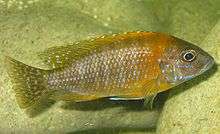 | 15 cm (5.9 in) | African Cichlid or Semi-aggressive Community | Easy | Beautiful coloration on males |
| Spilo | Champsochromis spilorhynchus | 40 cm (16 in) | African Cichlid or Semi-aggressive Community | |||
| Blue dolphin cichlid, lumphead cichlid | Cyrtocara moorii |  | 25 cm (9.8 in) | African Cichlid or Semi-aggressive Community | Easy | |
| Afra cichlid, dogtooth cichild | Cynotilapia afra |  | 10 cm (3.9 in) | Mbuna | Easy | |
| Rusty cichlid, lavender cichild | Iodotropheus sprengerae |  | 10 cm (3.9 in) | Mbuna | ||
| Fuelleborn's cichlid, Blue mbuna | Labeotropheus fuelleborni |  | 18 cm (7.1 in) | Mbuna | ||
| Electric yellow cichlid | Labidochromis caeruleus |  | 20 cm (7.9 in) | Mbuna | Easy | Very active and entertaining fish, need many rock caves to allow establishment of territories, less aggressive than other mbuna |
| Malawi eyebiter | Dimidiochromis compressiceps |  | Easy | |||
| Hongi, Red-top kimpumpa | Labidochromis sp. "Hongi" |  | 13 cm (5.1 in) | Mbuna | ||
| Labidochromis sp. "Mbamba Bay" | 13 cm (5.1 in) | Mbuna | ||||
| Auratus cichlid, Malawi golden cichlid | Melanochromis auratus | .jpg) | 10 cm (3.9 in) | Easy | Aggressive | |
| Chipokee cichlid | Melanochromis chipokae | 12 cm (4.7 in) | Mbuna | Easy | Aggressive | |
| Blue johanni cichlid, Maingano | Melanochromis cyaneorhabdos | 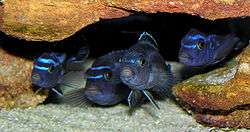 | 10 cm (3.9 in) | Mbuna | Easy | Very active and entertaining fish, need many rock caves to allow establishment of territories. Aggressive |
| Pearl of Likoma | Melanochromis joanjohnsonae |  | 10 cm (3.9 in) | Mbuna | ||
| Aurora | Melanochromis aurora | 10 cm (3.9 in) | Mbuna | Easy | ||
| Red zebra cichlid | Metriaclima estherae |  | 10 cm (3.9 in) | Mbuna | Easy | Very active and entertaining fish, need many rock caves to allow establishment of territories |
| Cobalt blue cichlid, cobalt zebra cichlid | Maylandia callainos |  | 10 cm (3.9 in) | Mbuna | Easy | Very active and entertaining fish, need many rock caves to allow establishment of territories |
| Kenyi cichlid | Maylandia lombardoi |  | 13 cm (5.1 in) | Mbuna | Easy | Aggressive; sexually dichromatic |
| Fusco | Nimbochromis fuscotaeniatus | 25 cm (9.8 in) | ||||
| Livingston's cichlid | Nimbochromis livingstonii |  | 25 cm (9.8 in) | |||
| Kaligono | Nimbochromis polystigma |  | 30 cm (12 in) | |||
| Venustus cichlid, giraffe cichild | Nimbochromis venustus | | 25 cm (9.8 in) | Easy | 'giraffe' spotting is juvenile coloration only | |
| Red empress cichlid | Protomelas taeniolatus |  | 15 cm (5.9 in) | |||
| Bumblebee cichlid, hornet cichlid | Pseudotropheus crabro | | 15 cm (5.9 in) | Mbuna | ||
| Yellow-tail acei | Pseudotropheus acei |  | 10 cm (3.9 in) | Mbuna | ||
| Johanni cichlid | Pseudotropheus johannii | | 10 cm (3.9 in) | Mbuna | Easy | Aggressive |
| Dwarf Mbuna | Pseudotropheus demasoni |  | 10 cm (3.9 in) | |||
| Saulosi | Pseudotropheus saulosi |  | 7.5 cm (3.0 in) | Mbuna | ||
| Malawi barracuda | Rhampsochromis cf. macrophthalmus | 23 cm (9.1 in) | ||||
| Tyrannochromis macrostoma | 38 cm (15 in) |
| Lake Tanganyika cichlids |
| Common name | Taxonomy | Picture | Size | Tank Type | Care Level | Remarks |
|---|---|---|---|---|---|---|
| Boulengerochromis microlepis | | 90 cm (35 in) | The largest cichlid | |||
| Frontosa cichild | Cyphotilapia frontosa |  | 40 cm (16 in) | Aggressive; well-known | ||
| Cyathopharynx furcifer | | Not readily available in the aquarium trade. | ||||
| Variabilichromis moorii |  | |||||
| Frontosa cichild | Cyphotilapia gibberosa | 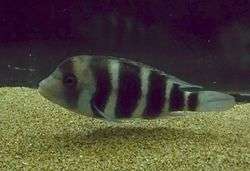 | 40 cm (16 in) | The frontosa have recently been broken up into three separate species. The gibberosa come from the southern part of the Lake | ||
| Frontosa cichild | Cyphotilapia sp. "North" | 40 cm (16 in) | This yet to be officially named species is intermediate in scale count between gibberosa and frontosa. | |||
| Julie cichlid | Julidochromis dickfeldi |  | Easy | Beautiful; interesting | ||
| Masked Julie | Julidochromis marlieri |  | 15 cm (5.9 in) fem / 10 cm (3.9 in) male | Easy | Striking coloration | |
| Julie cichlid | Julidochromis ornatus | |||||
| Julie cichlid | Julidochromis regani |  | 15 cm (5.9 in) fem / 10 cm (3.9 in) male | |||
| Julie cichlid | Julidochromis transcriptus |  | 10 cm (3.9 in) | Intermediate | Striking coloration | |
| Herring cichlid, sardine cichlid | Cyprichromis spp. |  | ||||
| Ectodus descampsii |  | |||||
| Chalinochromis spp. |  | |||||
| Neolamprologus multifasciatus |  | 3.8 cm (1.5 in) | A small shell-dwelling cichlid from Lake Tanganyika. Distinguished from the similar L. similis by the lack of striping on the face | |||
| Lamprologus ocellatus |  | 5 cm (2.0 in) | ||||
| Neolamprologus similis |  | 3.8 cm (1.5 in) | A small shell-dwelling cichlid from Lake Tanganyika. Very similar to N. multifsciatus but similis has striping from the body continue to the head | |||
| Lobochilotes labiatus | | 40 cm (16 in) | ||||
| Lyretail cichlid, fairy cichlid | Neolamprologus brichardi |  | 10 cm (3.9 in) | Easy | ||
| Lemon cichlid | Neolamprologus leleupi |  | 11.5 cm (4.5 in) | |||
| Featherfin | Ophthalmotilapia ventralis | 15 cm (5.9 in) | ||||
| Petrochromis trewavasae | 20 cm (7.9 in) | Aggressive | ||||
| Petrochromis sp. "Zaire Texas" | 18 cm (7.1 in) | |||||
| Simochromis pleurospilus | 10 cm (3.9 in) | |||||
| Tropheus duboisi |  | 13 cm (5.1 in) | Advanced | Males very aggressive; juveniles distinctively colored | ||
| Tropheus moorii |  | 14 cm (5.5 in) | Easy | |||
| Tropheus polli | 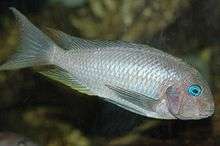 | 14 cm (5.5 in) |
| Lake Victoria cichlids |
| Common name | Taxonomy | Picture | Size | Tank Type | Care Level | Remarks |
|---|---|---|---|---|---|---|
| Astatotilapia aenocolor | 13 cm (5.1 in) | |||||
| Astatotilapia elegans | 10 cm (3.9 in) | |||||
| Zebra obliquidens | Astatotilapia latifasciata | 11.5 cm (4.5 in) | ||||
| Astatotilapia nubila | 11.5 cm (4.5 in) | |||||
| Astatotilapia piceatus | 10 cm (3.9 in) | |||||
| Astatotilapia schubotziellus | 10 cm (3.9 in) | |||||
| Astatotilapia sp. "Red Tail" | 11.5 cm (4.5 in) | |||||
| Astatotilapia sp. "Spot Bar" | 13 cm (5.1 in) | |||||
| Hippo Point Salmon | Ptyochromis sp. "Hippo Point Salmon" | 14 cm (5.5 in) | ||||
| Flameback | Pundamilia nyererei |  | 10 cm (3.9 in) | |||
| Xystichromis phytophagus | 10 cm (3.9 in) |
| Miscellaneous African cichlids (non-Rift Lake) |
| Common name | Taxonomy | Picture | Size | Tank Type | Care Level | Remarks |
|---|---|---|---|---|---|---|
| African butterfly cichlid | Anomalochromis thomasi |  | ||||
| Jewel cichlid, two-spotted jewel cichlid | Hemichromis bimaculatus |  | 4-5 inch | Easy | other hemichromis species are sometimes sold under the same name | |
| Steatocranus spp. |  | |||||
| Lifalili jewel cichlid, blood-red jewel cichlid | Hemichromis lifalili | |||||
| Kribensis, krib | Pelvicachromis pulcher | .jpg) | Easy | Readily breed in small aquaria. Aggressive and territorial towards other fishes especially its own kind during mating and after spawning | ||
| Zebra tilapia | Tilapia buttikoferi |  | ||||
| Guenther's Mouthbrooder | Chromidotilapia guentheri |  | ||||
| Allauad's haplo | Astatoreochromis alluaudi |  | ||||
| Pale usisya aulonocara | Aulonocara steveni |  | ||||
| Benthochromis tricoti |  |
| Dwarf cichlids (apistogrammas, rams and others) |
| Common name | Taxonomy | Picture | Size | Tank Type | Care Level | Remarks |
|---|---|---|---|---|---|---|
| Agassiz's dwarf cichlid | Apistogramma agassizii |  | Advanced | Beautiful | ||
| Zebra acara | Nannacara adoketa |  | ||||
| Yellow dwarf cichlid | Apistogramma borellii | |||||
| Cockatoo dwarf cichlid | Apistogramma cacatuoides |  | ||||
| Panda dwarf cichlid | Apistogramma nijsseni | .jpg) | ||||
| Three-Stripe Dwarf Cichlid | Apistogramma trifasciata | |||||
| Apistogramma eremnopyge | ||||||
| Two-Stripe Dwarf Cichlid | Apistogramma bitaeniata | 7.5 cm (3.0 in) | 40 litre (10 gallon) tank for one pair | Intermediate | ||
| Checkerboard Cichlid | Dicrossus filamentosus | |||||
| Blue ram, German ram | Mikrogeophagus ramirezi |  | Easy | Fairly common | ||
| Bolivian ram | Mikrogeophagus altispinosa |  | ||||
| Dwarf flag cichlid | Laetacara curviceps |
| American cichlids (cichlasomas, acaras, angelfish, discuses and others) |
| Common name | Taxonomy | Picture | Size | Tank Type | Care Level | Remarks |
|---|---|---|---|---|---|---|
| Midas cichild, red devil cichlid | Amphilophus citrinellus | 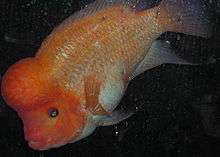 | Note that Amphilophus labiatus is also called red devil cichild | |||
| Poor man's tropheus | Hypsophrys nematopus | | ||||
| Red devil cichlid | Amphilophus labiatus |  | ||||
| Firemouth cichlid | Cichlasoma meeki |  | Easy | Typically medium aggression; easily bred | ||
| Jack Dempsey cichlid | Cichlasoma octofasciatum |  | ||||
| Jaguar cichlid, managuense cichlid | Parachromis managuensis |  | Easy | Exceptionally beautiful adult coloration; large adult size | ||
| Mayan cichlid | Cichlasoma urophthalmus |  | ||||
| Convict cichlid | Archocentrus nigrofasciatus |  | Easy | Common, very easy to breed, aggressive. A beautiful fish with bad temper. Small variations in colors, can be found in almost completely black and white coloration - therefore the name "Convict" | ||
| T-bar cichlid | Cryptoheros sajica | .jpg) | ||||
| Severum | Heros severus |  | Easy | the gold variety is more common than the natural green one | ||
| Green terror | Andinoacara rivulatus |  | Fairly common | |||
| Blue acara | Andinoacara pulcher | |||||
| Thread-finned acara | Acarichthys heckelii | | ||||
| Eartheater cichlid | Geophagus altifrons | |||||
| Greenstreaked Eartheater, cupid cichlid | Biotodoma cupido |  | ||||
| Keyhole cichlid | Cleithracara maronii | 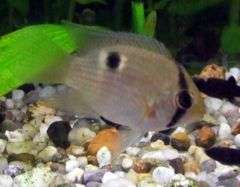 | ||||
| Angelfish | Pterophyllum scalare |  | 15 cm (5.9 in) | Intermediate | several color varieties; this species is the common angelfish in the aquarium trade. Angelfish can grow up to fifteen centimetres (six inches), and therefore should be housed in a large aquarium. Angelfish should be kept alone, or kept with three or more. This is because that if two are kept together, the larger fish will pick on the smaller fish. Angelfish are not as hardy as other cichlids and should not be kept with small fish such as neon tetras. However, just the opposite is true: Angelfish should not be kept with fish that may nip and annoy it such as some large tetras. | |
| Altum angelfish | Pterophyllum altum |  | Difficult | |||
| Spotted angelfish | Pterophyllum leopoldi |  | ||||
| Common discus, red discus | Symphysodon discus |  | 20 cm (7.9 in) | Difficult | various color varieties, the discus requires high water quality and a varied diet. Do not keep with fast fish as the discus is a slow eater and will not fight for food. Despite their beauty, the discus is one of the least hardy aquarium fishes available. This fish should only be kept by the experienced aquarium keeper. | |
| Blue discus, green discus | Symphysodon aequifasciatus |  | 20 cm (7.9 in) | Difficult | fancy hybrids of this species and Symphysodon discus can also be found in trade | |
| Chocolate cichlid | Hypselecara temporalis | |||||
| Oscar | Astronotus ocellatus |  | 45 cm (18 in) | has different varieties including long-fin, albino, golden, etc. The oscar cichlid is fast growing and can grow to a very large size when mature, and therefore should be housed in a large aquarium. The oscar can be messy to look after as they love to dig up plants and scoop up rocks. The oscar should be put with fish of similar size as they will eat any fish that can fit in their mouth. The oscar prefers to be with members of its own species, but this is not a necessity for its well being. The oscar is one of the more hardy cichlids, and can be put with other large cichlids, pacus, large plecos, large sharks, and other large fish. | ||
| Uaru, waroo | Uaru amphiacanthoides | Also known as the Triangle Ciclid. | ||||
| Peacock bass, butterfly peacock bass | Cichla orinocensis |  | ||||
| Texas cichlid, Rio Grande cichlid | Herichthys cyanoguttatus | .jpg) | Easy | Large adult size |
| Other cichlids |
| Common name | Taxonomy | Picture | Size | Tank Type | Care Level | Remarks |
|---|---|---|---|---|---|---|
| Orange chromide | Etroplus maculatus | |||||
| Blood parrot cichlid | - Hybrid - |  | In the scientific community it is not considered a cichlid (or any species of fish) because it does not occur naturally in the wild (created by man), for this reason it will not be given a scientific name. | |||
| Flowerhorn cichlid | - Hybrid - |  25 cm (9.8 in) 25 cm (9.8 in) | Difficult | In the scientific community it is not considered a cichlid (or any species of fish) because it does not occur naturally in the wild (created by man), for this reason it will not be given a scientific name. This is also an aggressive fish and does best in a species-only setup. | ||
| Flowerhorn Kingkamfa | Hybrid |  Kingkamfa flowehorn 20 cm (8") |
Adult size. This male flowerhorn is result of many cross breeding. Many male flowerhorns are sterile[4] | |||
| Wolf cichlid | Parachromis dovii | |||||
Cyprinids
| Barbs |
| Common name | Taxonomy | Picture | Size | Tank Type | Care Level | Remarks |
|---|---|---|---|---|---|---|
| Arulius barb | Dawkinsia arulius | 12 cm (4.7 in) | ||||
| Bigspot barb, Duncker's barb | Barbodes dunckeri | 13 cm (5.1 in) | Peaceful when small but should not be kept with other species at adulthood. | |||
| Black ruby barb | Pethia nigrofasciatus |  | 6.5 cm (2.6 in) | |||
| Checker barb | Oliotus oligolepis |  | 5 cm (2.0 in) | |||
| Cherry barb | Puntius titteya |  | 4.8 cm (1.9 in) | Community | Easy | very peaceful, and works well with white clouds and neon tetras |
| Clipper barb | Barbus callipterus | 7.5 cm (3.0 in) | ||||
| Clown barb | Barbodes everetti |  | 15 cm (5.9 in) | |||
| Denison's barb, red line torpedo barb | Sahyadria denisonii |  | 15 cm (5.9 in) | Semi-aggressive Community | ||
| Gold barb | Barbodes semifasciolatus |  | 8 cm (3.1 in) | Community | Easy | |
| Golden barb | Pethia gelius | 5 cm (2.0 in) | ||||
| Greenstripe barb | Puntius vittatus | 5 cm (2.0 in) | ||||
| Indian Glass Barb | Laubuca laubuca | 6.7 cm (2.6 in) | Community | Easy | ||
| Melon barb | Puntius fasciatus | 15 cm (5.9 in) | ||||
| Odessa barb | Puntius padamya |  | 8 cm (3.1 in) | Semi-aggressive Community | Easy | |
| Onespot barb | Puntius terio | 15 cm (5.9 in) | Semi-aggressive Community | |||
| Panda barb | Puntius fasciatus |  | 5 inches | Community | ||
| Pentazona barb, fiveband barb | Puntius pentazona |  | 5 cm (2.0 in) | Semi-aggressive Community | this species may be confused with tiger barb due to similarities | |
| Pool barb | Puntius sophore |  | 18 cm (7.1 in) | Semi-aggressive Community | ||
| Partipentazona barb | Puntigrus partipentazona | | 3.8 cm (1.5 in) | Semi-aggressive Community | ||
| Rosy barb | Pethia conchonius |  | 13 cm (5.1 in) | Semi-aggressive Community | Easy | |
| Shortfin barb | Barbus brevipinnis | 4.6 cm (1.8 in) | Semi-aggressive Community | |||
| Snakeskin barb | Desmopuntius rhomboocellatus |  | 5 inches | Community | ||
| Spanner barb, t-barb | Barbodes lateristriga | 20 cm (7.9 in) | Semi-aggressive Community | |||
| Spotted barb, common barb | Barbodes binotatus | 19.5 cm (7.7 in) | Semi-aggressive Community | |||
| Spottedsail barb, dwarf barb | Pethia phutunio | 7.8 cm (3.1 in) | Semi-aggressive Community | |||
| Swamp barb | Puntius chola |  | 15 cm (5.9 in) | Semi-aggressive Community | ||
| Ticto barb | Barbus ticto | 10 cm (3.9 in) | Semi-aggressive Community | |||
| Tic-tac-toe barb | Puntius stoliczkanus |  | 5 cm (2.0 in) | |||
| Tiger barb, sumatra barb | Puntius tetrazona |  | 7.5 cm (3.0 in) | Semi-aggressive Community | Easy | There are many varieties as well as hybrids with other barbs. Good community schooling fish. |
| Tinfoil barb | Barbonymus schwanenfeldii |  | 36 cm (14 in) | Semi-aggressive Community | This species is much larger than most other barbs |
| Cold-water cyprinids |
| Common name | Taxonomy | Picture | Size | Tank Type | Care Level | Remarks |
|---|---|---|---|---|---|---|
| Goldfish | Carassius auratus | | 15+ cm (6+ in) | Species/Pond | Easy | variations: Black Moor, Bubble Eye, Butterfly Tail, Calico, Celestial Eye, Comet, Common, Fantail, Lionchu, Lionhead, Oranda, Panda Moor, Pearlscale, Pompom, Ranchu, Ryukin, Shubunkin, Telescope eye, Veiltail |
| Koi, common carp | Cyprinus carpio |  | 30+ cm (12+ in) | Pond | Easy | the fancy variations of common carp are known as koi. |
| Bitterling | Rhodeus amarus |  | 10 cm (4 in) | Pond | Easy | |
| White Cloud Mountain minnow | Tanichthys albonubes |  | 3.8 cm (1.5 in) | Pond/Community | Easy | lutino variety can also be found in the aquarium trade |
| Common dace | Leuciscus leuciscus |  | 40 cm (16 in) | Temperature 39 to 72 °F (4 to 22 °C); ph 6.0 to 8.0 | ||
| Rosy red minnow, fathead minnow | Pimephales promelas |  | 5–7.5 cm (2.0–3.0 in) | Pond/Minnow Tank | Easy | sold as feeder fish; the gold variety known as "rosy red" is very common (the image is of the "rosy red" strain) Temperature 10–21 °C (50–70 °F) pH 7.0 - 7.5 |
| European minnow | Phoxinus phoxinus | 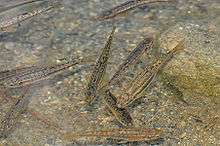 | Pond/Minnow Tank | Easy | ||
| Southern redbelly dace | Phoxinus erythrogaster |  | 7.5–10 cm (3.0–3.9 in) | Pond/Minnow Tank | Easy | |
| Tench | Tinca tinca |  | Pond | Moderate | A few color varieties have been made from the wild species, even some multicolored. | |
| Golden orfe | Leuciscus idus | | Pond | Easy | ||
| Danios and other danionins |
| Common name | Taxonomy | Picture | Size | Tank Type | Care Level | Remarks |
|---|---|---|---|---|---|---|
| Bengal danio, Sind danio | Devario devario | |||||
| Giant danio | Devario aequipinnatus | | ||||
| Malabar danio | Devario malabaricus |  | 11.5–14 cm (4.5–5.5 in) | Community | Easy | |
| Pearl danio | Danio albolineatus |  | 6.5 cm (2.6 in) | Easy | subspecies:blue-redstripe danio, Kedah danio | |
| Queen danio | Devario regina | |||||
| Spotted danio | Danio nigrofasciatus |  | Easy | |||
| Turquoise danio | Danio kerri | 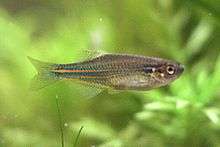 | ||||
| Zebra danio | Danio rerio |  | 5 cm (2.0 in) | Easy | there are many variations of this fish: leopard danio, the spotted colour morph, and GloFish, the genetically modified fluorescent fish. |
| Rasboras |
| Common name | Taxonomy | Picture | Size | Tank Type | Care Level | Remarks |
|---|---|---|---|---|---|---|
| Harlequin rasbora | Trigonostigma heteromorpha |  | 5 cm (2.0 in) | Community | Easy | Also known as Harlequin tetra |
| Espei rasbora | 5 cm (2.0 in) | Community | Easy | |||
| Hengeli rasbora | 5 cm (2.0 in) | Community | Easy | |||
| Blackline rasbora, red-tailed rasbora | Rasbora borapetensis | | ||||
| Red-striped rasbora | Rasbora pauciperforata | 7.5 cm (3.0 in) | Community | Range: Sumatra Temperature 22–29 °C (72–84 °F) | ||
| Volcano rasbora | Rasbora vulcanus |
| Other cyprinids |
| Common name | Taxonomy | Picture | Size | Tank Type | Care Level | Remarks |
|---|---|---|---|---|---|---|
| Bala shark | Balantiocheilus melanopterus | .jpg) | 40 cm (16 in) | Community | Semi-aggressive Community | |
| Black shark | Labeo chrysophekadion |  | 2' | Community | Semi-aggressive Community | |
| Flying fox (fish) | Epalzeorhynchos kalopterus |  | Semi-aggressive Community | this species may be sold as Siamese algae eater | ||
| Red-tailed black shark | Epalzeorhynchos bicolor | 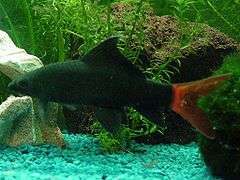 | 6 in | Semi-aggressive Community | Easy | albino variation available. aggressive with fish of same species. best kept alone or in groups of 5 or more. |
| Rainbow shark | Epalzeorhynchos frenatum | | 6 in | Semi-aggressive Community | Easy | albino variation available. aggressive with other fish of same species. best kept either alone, or in groups of 5 or more individuals. |
| Cambodian log sucker, false Siamese algae eater | Garra cambodgiensis |  | this species may be sold as Siamese algae eater | |||
| Chinese algae eater | Gyrinocheilus aymonieri |  | Easy | This species may be sold as Siamese algae eater. A gold colored form also exists. Could be territorial | ||
| Siamese algae eater | Crossocheilus siamensis | _by_Ark.jpg) | 6 in | Community | Easy | Many other cyprinids are sometimes mistakenly sold under this name. Very likely to jump out of the aquarium especially after reaching adult size. Very useful for getting rid of algae when it is young but prefer fish food upon reaching adulthood. |
Darters
| Common name | Taxonomy | Picture | Size | Tank Type | Care Level | Remarks |
|---|---|---|---|---|---|---|
| African striped darter | Nannocharax fasciatus |  | ||||
| Banded darter | Etheostoma zonale | |||||
| Gilt darter | Percina evides |  | ||||
| Orangethroat darter | Etheostoma spectabile |  | ||||
| Rainbow darter | Etheostoma caeruleum |  | ||||
| Splendid darter | Etheostoma barrenense | |||||
Gobies
| Common name | Taxonomy | Picture | Size | Tank Type | Care Level | Remarks |
|---|---|---|---|---|---|---|
| Black toraja goby | Mugilogobius sarasinorum | |||||
| Bumblebee goby | Brachygobius doriae |  | ||||
| Dragon goby, Violet goby | Gobioides broussonnetii |  | ||||
| Emerald river goby | Gobionellus smaragdus | |||||
| Empire goby | Hypseleotris maculatus | |||||
| Knight goby | Stigmatogobius sadanundio |  | ||||
| Marbled sleeper | Oxyeleotris marmorata | | ||||
| No Common Name | Rhinogobius duospilus |  | ||||
| Peacock goby | Tateurndina ocellicauda |  | ||||
| Purple sleeper goby | Mogurnda mongurnda | 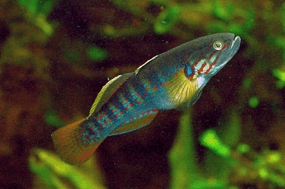 | ||||
| Striped sleeper goby | Dormitator maculatus | |||||
Killifish
| Common name | Taxonomy | Picture | Size | Tank Type | Care Level | Remarks |
|---|---|---|---|---|---|---|
| American Flagfish | Jordanella floridae |  | Species | Easy | ||
| Arabian Killifish | Aphanius dispar | Species | Easy/Intermediate | |||
| Argentine Pearl | Austrolebias nigripinnis |  | Species | Easy/Intermediate | ||
| Blue Lyretail | Fundulopanchax gardneri |  | 2 in | Species | Easy/Intermediate | |
| Bluefin Notho, Rachow's Notho, Rainbow Notho | Nothobranchius rachovii |  | 6 cm (2.4 in) | Species | Easy/Intermediate | Considered most beautiful freshwater fish by some killifish enthusiasts. |
| Clown Killifish | Aplocheilus annulatus | Species | ||||
| Golden Toppminnow | Fundulus chrysotus |  | Species | Easy | ||
| Red-seam Killifish | Aphyosemion calliurum | Species | Easy | |||
| Striped panchax, Golden Wonder | Aplocheilus lineatus | | Species | Easy | Golden Wonder is the more yellowish variant. | |
Labyrinth fish
| Common name | Taxonomy | Picture | Size | Tank Type | Care Level | Remarks |
|---|---|---|---|---|---|---|
| Chocolate gourami | Sphaerichthys osphromenoides |  | 7 cm (2.8 in) | Difficult | ||
| Croaking gourami | Trichopsis vittata | | 6.5 cm (2.6 in) | Often confused with the pygmy gourami | ||
| Dwarf gourami | Colisa lalia | 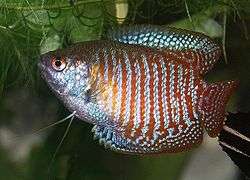 | 5 cm (2.0 in) | Community/species | Intermediate | the dwarf gourami is perfect for small to mid-sized aquariums as it will not grow as large as its larger relatives. A beautiful, peaceful gourami. Prone to bacterial infections . When harassed by species other than its own it will not make any effort to defend itself often leading to death. |
| Giant gourami | Osphronemus goramy | 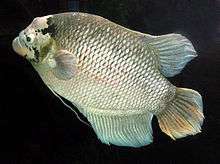 | 60 cm (24 in) | Occasionally, some other gouramis are also referred to as "giant gouramis" | ||
| Paradise fish | Macropodus opercularis |  | 7.5 cm (3.0 in) | One of the few freshwater aquarium fish that survive in cold water. Most common variety is the Blue Paradise. | ||
| Pearl gourami | Trichopodus leerii |  | 11.5 cm (4.5 in) | |||
| Pygmy gourami, Sparkling gourami | Trichopsis pumila |  | 3.8 cm (1.5 in) | Often confused with the croaking gourami | ||
| Kissing gourami | Helostoma temminckii |  | 15 cm (5.9 in) | The pink variety is more popular than the natural green one. They are called Kissing Gouramis because the seem to pucker their lips outwards. they require aquarium salt in the water or hard water | ||
| Moonlight gourami | Trichopodus microlepis |  | 15 cm (5.9 in) | |||
| Snakeskin gourami | Trichopodus pectoralis |  | 20 cm (7.9 in) | |||
| Three spot gourami | Trichopodus trichopterus |  | 10 cm (3.9 in) | Easy | Various color varieties each given a different name (blue gourami, gold gourami, and opaline gourami) | |
| Siamese fighting fish (sometimes Betta, esp. US) | Betta splendens |  | 7.5 cm (3.0 in) | Single fish only for males, community for females. | Easy | Numerous color and fin pattern varieties. Betta is the name of the genus that includes more than 60 species other than the Siamese fighting fish. Multiple males in a tank will result in conflicts and possibly death. Females can be housed together in groups of 5+ in a tank, though they may become territorial and attack each other. Males have long flowing fins with vibrant colors, and females have shorter fins. This fish is best put with fish that do not nip fins, as the fins of the betta are easy to attack. They should also not be housed with other fish with long, flowing fins as the Betta may confuse it with another male, and attack. |
| Giant betta | Betta Anabatoides | [] | 12 cm (4.7 in) | Single fish only for males, community for females. | Medium | Sometimes refers to a giant mutant of betta splendens. Multiple males in a tank will result in conflicts and possibly death. Females can be housed together in groups of 5+ in a tank, though they may become territorial and attack each other. Males have longer fins and a larger head. Females have shorter fins. This fish is best put with fish that do not nip fins, as the fins of the betta are easy to attack. Because of their size they need a larger aquarium |
Live-bearers
| Guppies and mollies |
| Common name | Taxonomy | Picture | Size | Tank Type | Care Level | Remarks |
|---|---|---|---|---|---|---|
| Guppy | Poecilia reticulata |  | 5 cm (2.0 in) | Community/Species | Easy | Many color and tail pattern varieties exist. They generally need a ratio of 1 male to 2 females or more. |
| Endler's livebearer | Poecilia wingei | | 3.8 cm (1.5 in) | Community/Species | Easy | |
| Black molly | Poecilia sphenops | | 5 cm (2.0 in) | Community/Species | Easy | |
| Sailfin molly | Poecilia latipinna | 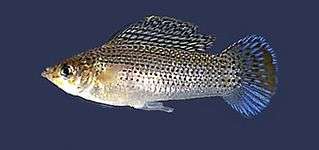 | 5 cm (2.0 in) | Community/Species | Easy | Gold and silver varieties commonly found; also thrive in brackish water |
| Dalmatian molly | hybrid |  | 5 cm (2.0 in) | Community/Species | Easy | The dalmatian molly is a hybrid color variation that can be generated by crossing some species of Poecilia, like P. sphenops and P. latipinna. The variety "Dalmatian" is spotted alike to a Dalmatian dog. |
| Lyretail Molly | Variety |  | 5 cm (2.0 in) | Community/Species | Easy | Lyretail Mollies are available in all of these species, can be cross bred with any species of Molly. |
| Platies and swordtails |
| Common name | Taxonomy | Picture | Size | Tank Type | Care Level | Remarks |
|---|---|---|---|---|---|---|
| Southern platy | Xiphophorus maculatus |  | Community/Species | Easy | Many color varieties exist | |
| Variable platy | Xiphophorus variatus |  | Community | Easy | Sometimes called Feeder platy because can be used to feed larger fish like Stingrays, Payara, Cichlida, Pickerel, Catfish, Sunfish, Arowanas, Gar, Arapaima, and other predator fish. Many color varieties exist | |
| Green swordtail | Xiphophorus hellerii | 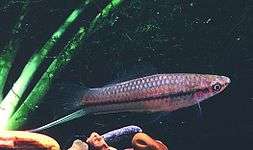 | Community | Easy | Many color varieties exist | |
| Other Livebearers, like Gambusia |
| Common name | Taxonomy | Picture | Size | Tank Type | Care Level | Remarks |
|---|---|---|---|---|---|---|
| Western mosquitofish | Gambusia affinis | | Community/pond | Easy | ||
| Eastern mosquitofish | Gambusia holbrooki |  | Community/pond | Easy | ||
| Celebes half beak | Nomorhamphus liemi |  | Community | Difficult | ||
| Cuban lima | Limia vittata |  | Community | Easy | ||
| Tangunyika pearl killifish | Lamprichthys tanganicus | | Community | Easy | Not actually a type of killifish but a livebearer. | |
| Knife livebearer | Alfaro cultratus |  | Community | Easy | ||
| Least killifish | Heterandria formosa | .jpg) | Community/pond | Easy | Not as common as other livebearers in the aquarium trade. One of the smallest fish in the world. | |
Loaches and related cypriniformes
| Loaches |
| Common name | Taxonomy | Picture | Size | Tank Type | Care Level | Remarks |
|---|---|---|---|---|---|---|
| Bengal loach | Botia dario |  | 6 in (15 cm) | Also known as the Queen loach. They hide during the day. They like river sand in the tank because they like to cover themselves in it. | ||
| Blue botia | Yasuhikotakia modesta |  | ||||
| Burmese border loach | Botia kubotai |  | 5 in (13 cm) | |||
| Clown loach | Chromobotia macracanthus |  | 7-15 in | community | Intermediate | Clown loach has a sociable personality and should be kept in at least groups of 5. They may eat pond snails kept in aquariums. Clown loaches will eventually need a 6' long aquarium |
| Dwarf loach | Yasuhikotakia sidthimunki |  | formerly named Botia sidthimunki | |||
| Dojo loach, weather loach | Misgurnus anguillicaudatus |  | ||||
| Horseface loach | Acantopsis choirorhynchus |  | ||||
| Kuhli loach, coolie loach | Pangio kuhlii |  | Community | Easy | a number of similar Pangio species are sold under the same name | |
| Longnose loach | Acantopsis octoactinotos |  | ||||
| Skunk loach | Yasuhikotakia morleti |  | formerly named Botia morleti | |||
| Yoyo loach | Botia almorhae |  | ||||
| Zebra loach | Botia striata |  |
| Other related cypriniformes |
| Common name | Taxonomy | Picture | Size | Tank Type | Care Level | Remarks |
|---|---|---|---|---|---|---|
| Chinese high fin banded shark | Myxocyprinus asiaticus |  | 90+ cm (36+ in) | Goldfish/Large Pond | Difficult | the highfin shark is a truly unique fish. At youth, the shark has a high dorsal fin, a plump body, and radiant colors. However, as the fish matures, the characteristics of the fish changes drastically. The dorsal fin becomes shorter, the fish achieves a more cylindrical shape, and the color fades to a dark brown. The fish is not suitable for fish tanks because of the size it can grow to. The highfin cannot be housed with tropical fish due to their lower temperature preferences. The highfin prefers to be in a school, so more than one should be housed together. The "shark" is a peaceful fish, and will not openly attack others. Highfins are bottom dwellers and omnivorous. They will eat invertebrates and scrape algae off rocks. |
| Chinese hillstream loach | Beaufortia kweichowensis |  | 3 in | Hillstream Community | easy | Eats a mainly algae. High oxygen level required in addition to a strong current |
Neotropical electric fish
| Common name | Taxonomy | Picture | Size | Tank Type | Care Level | Remarks |
|---|---|---|---|---|---|---|
| Black ghost knifefish | Apteronotus albifrons |  | 20 in | Semi-aggressive Community | Intermediate | Not to be confused with the featherback "knifefish" of the Bonytongue group (see above) Very aggressive to other knifefish, but otherwise peaceful. Temperature 23-28C (73-82F). pH 6.0-8.0 |
| Brown ghost knifefish | Apteronotus leptorhynchus | Semi-aggressive Community | Intermediate | Very hard to feed it anything but live food | ||
| Elephant nose | Gnathonemus petersii | 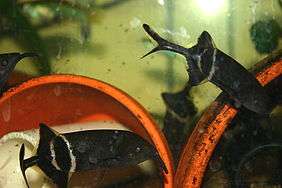 | Semi-aggressive Community | Intermediate/Difficult | ||
| Electric eel | Electrophorus electricus |  | Advanced | Despite the name, this is not an "eel" but rather a huge knifefish; illegal to possess in some areas; dangerous; very large adult size | ||
| Glass knifefish | Eigenmannia virescens |  | Peaceful Community | Intermediate | ||
Pufferfish
| Common name | Taxonomy | Picture | Size | Tank Type | Care Level | Remarks |
|---|---|---|---|---|---|---|
| Amazon puffer | Colomesus asellus |  | ||||
| Fahaka puffer | Tetraodon lineatus | | 1-foot 5 inches | Difficult | ||
| Figure 8 pufferfish | Tetraodon biocellatus |  | 6 cm (2.4 in) | Intermediate | often sold as freshwater fish, but this species prefers brackish water | |
| Green spotted puffer | Tetraodon nigroviridis |  | 15 cm (5.9 in) | Difficult | often sold as freshwater fish, but this species actually thrives in brackish water and may even require saltwater when reaches adulthood | |
| Giant freshwater pufferfish | Tetraodon mbu |  | 75 cm (30 in) | Difficult | This fish also occurs in estuaries. | |
| Dwarf pufferfish | Carinotetraodon travancoricus | | 2.9 cm (1.1 in) | easy | ||
| Congo pufferfish | Tetraodon miurus |  | 15 cm (5.9 in) | Difficult | ||
Rainbowfish
| Common name | Taxonomy | Picture | Size | Tank Type | Care Level | Remarks |
|---|---|---|---|---|---|---|
| Salmon-red rainbowfish | Glossolepis incisus | | 13–15 cm (5.1–5.9 in) | a.k.a. Red rainbowfish. These are very hardy fish and get along with almost any fish. They aren't aggressive and love to follow fingers! When these fish get stressed out they tend to turn a more gray color. It will regain its color when it becomes more relaxed | ||
| Tami River rainbowfish | Glossolepis pseudoincisus | 7.5 cm (3.0 in) | a.k.a. Millennium rainbowfish | |||
| Lake Wanam rainbowfish | Glossolepis wanamensis |  | 13–15 cm (5.1–5.9 in) | a.k.a. Emerald rainbowfish | ||
| Threadfin rainbowfish | Iriatherina werneri | 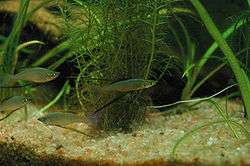 | Species | Easy | Threadfins have very tiny mouths and cannot compete well with other fish for food. Keep in species only tanks or with small Pseudomugil (i.e.: gertrudae) | |
| New Guinea rainbowfish | Melanotaenia affinis | 13 cm (5.1 in) | ||||
| Boeseman's rainbowfish | Melanotaenia boesemani |  | 10–13 cm (3.9–5.1 in) | |||
| Duboulayi's rainbowfish | Melanotaenia duboulayi | 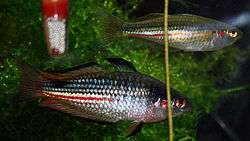 | 13–15 cm (5.1–5.9 in) | a.k.a. Crimson-Spotted rainbowfish | ||
| Australian rainbowfish | Melanotaenia fluviatilis |  | 13–15 cm (5.1–5.9 in) | |||
| Lake Kurumoi rainbowfish | Melanotaenia parva |  | 7.5–8 cm (3.0–3.1 in) | a.k.a. Flame rainbowfish | ||
| Madagascar rainbowfish | Bedotia madagascariensis |  | 7.5–8 cm (3.0–3.1 in) | |||
| Neon rainbowfish | Melanotaenia praecox | .jpg) | 6–7.5 cm (2.4–3.0 in) | |||
| Eastern rainbowfish | Melanotaenia splendida splendida |  | 13–15 cm (5.1–5.9 in) | |||
Spiny eels
| Common name | Taxonomy | Picture | Size | Tank Type | Care Level | Remarks |
|---|---|---|---|---|---|---|
| Fire eel | Mastacembelus erythrotaenia |  | 100 cm (39 in) | |||
| Spotfinned spiny eel | Macrognathus siamensis | | 30 cm (12 in) | |||
| Tire track eel | Mastacembelus armatus |  | 90 cm (35 in) | |||
| Lesser spiny eel | Macrognathus aculeatus |
Sunfish and relatives
| Common name | Taxonomy | Picture | Size | Tank Type | Remarks | |
|---|---|---|---|---|---|---|
| Orangespotted sunfish | Lepomis humilis |  | ||||
| Pumpkinseed | Lepomis gibbosus |  | ||||
| Redbreast sunfish | Lepomis auritus |  | ||||
| Redear sunfish | Lepomis microlophus |  | ||||
| Longear sunfish | Lepomis megalotis | _(20396406).jpg) | ||||
| Blackbanded sunfish | Enneacanthus chaetodon |  | ||||
| Blue-spotted sunfish | Enneacanthus gloriosus |  | ||||
| Bluegill | Lepomis macrochirus | .jpg) | ||||
| Green sunfish | Lepomis cyanellus | | ||||
| Warmouth | Lepomis gulosus | _(2497915731).jpg) | ||||
| Pygmy sunfish | Elassomatidae |  | ||||
Gar
| Common name | Taxonomy | Picture | Size | Tank Type | Remarks | |
|---|---|---|---|---|---|---|
| Spotted Gar | Lepisosteus oculatus |  | 70 cm (27.5 in) | Large | One species of the gars, the Alligator gar (Atractosteus spatula) can attain an astounding length of 3m in the wild. On average, gars can attain a length of not less than 70 cm in captivity. They are aggressive fish by nature, however, they are also frightened easily.
These fish are generally piscivorous in the wild, but will take a variety of meaty foods in captivity. Therefore, a strong filtration system must be ensured for a healthy gar tank. Housing a 6-inch gar may require at least a 50 US gallons (190 L) tank with width of 12 inches. As the gar grows, it must be moved to a larger tank. The tank length to house a sub-adult gar should be at least 72 inches, but longer is even better. The width of the tank should not be less than 36 inches. (otherwise, the gar may feel uncomfortable making turns while it swims) A minimum of 24 inches of water depth will suit the gar well. Gars are strong jumpers, hence the tank lid should be weighted down. Gars are hardy fish. They have the ability to breathe atmosphere air by means of vascularised gas bladder that act as lung. They are generally peaceful, usually keeping to themselves and not disturbing others. Hence, if space allows, they can be kept in a group. Large gars are capable of inflicting a painful wound. If possible, try not to handle them with bare hands. Always use a net. | |
| Florida Gar | Lepisosteus platyrhincus | | 70 cm (27.5 in) | Large | ||
| Longnose Gar | Lepisosteus osseus | | Large | |||
| Shortnose Gar | Lepisosteus platostomus |  | Large | |||
| Alligator Gar | Atractosteus spatula | _(3149748488).jpg) | 300 cm (118 in) | Large | ||
| Cuban Gar | Atractosteus treacherous | | 200 cm (78.5 in) | Large | ||
| Tropical Gar | Atractosteus tropcius | | 150 cm (59 in) | Large |
Other fish
| Common name | Taxonomy | Picture | Size | Tank Type | Remarks | |
|---|---|---|---|---|---|---|
| Clown knifefish | Chitala ornata | .jpg) | Intermediate | |||
| Ocellate river stingray | Potamotrygon motoro |  | ||||
| Black devil stingray | Potamotrygon leopoldi |  | ||||
| Freshwater pipefish | Doryichthys martensii | |||||
| Sterlet | Acipenser ruthenus |  | ||||
| Shovelnose Sturgeon | Scaphirhynchus platorynchus |  | ||||
| Freshwater needlefish | Xenentodon cancila | | ||||
| Pickerel | Esox americanus | | ||||
| Freshwater sole | Brachirus panoides | |||||
| Brook stickleback | Culaea inconstans |  | ||||
| Medaka | Oryzias latipes | -1.jpg) | ||||
| European Perch | Perca fluviatilis | 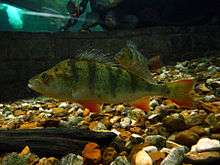 | ||||
| Lungfish | subclass Dipnoi | .jpg) | ||||
See also
- List of aquarium fish by scientific name
- List of brackish aquarium fish species
- List of fish common names
- List of freshwater aquarium amphibian species
- List of freshwater aquarium invertebrate species
- List of freshwater aquarium plant species
- List of marine aquarium fish species
- List of marine aquarium invertebrate species
- The Aquarium Wiki Encyclopaedia List of Freshwater aquarium fish
Sources
| Wikimedia Commons has media related to Freshwater aquarium fish. |
- Encyclopedia of Aquarium and Pond Fish (2005) (David Alderton)
- 500 Aquarium Fish: A Visual Reference to the Most Popular Species
References
- ↑ http://www.fishbase.org/summary/Corydoras-haraldschultzi.html Fishbase:haraldschultzi
- ↑ http://www.fishbase.org/summary/Corydoras-sterbai.html Fishbase:sterbai
- ↑ http://www.fishbase.org/Summary/SpeciesSummary.php?ID=12199&AT=Threestripe+corydoras Fishbase:thilineatus
- ↑ "More flowerhorn guides on caring, breeding, determining sex". Thai FH - Supplier of flowerhorn fish international. Retrieved 2016-02-05.